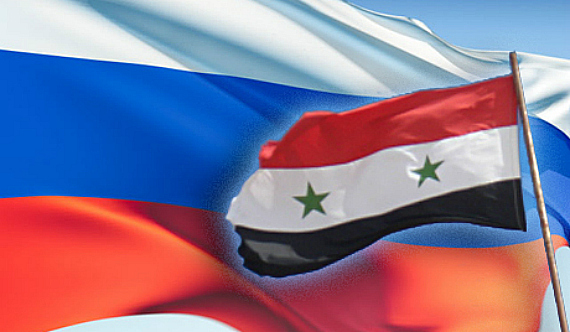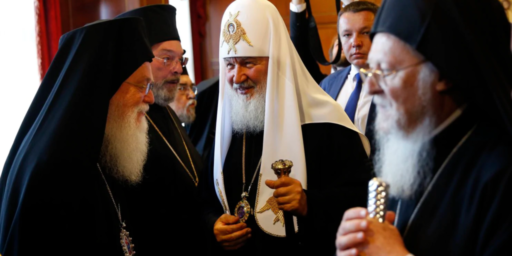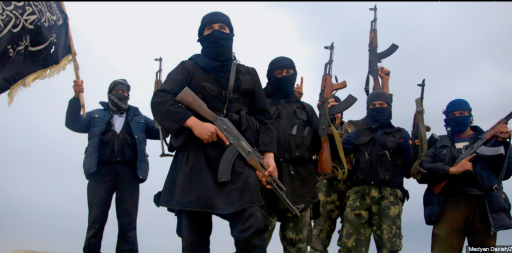Russia And Syria: More Than Meets The Eye
The factors influencing Russian policy in Syria are many, and some of them are quite ancient.
Russia has been stubbornly resistant to any efforts by the international community to bring about the end of the regime of Bashar Assad, and stands as the primary barrier (along with China) to any significant action on the Syrian issue by the U.N. Security Council. Russia also remains a primary arms supplier to the Assad regime, for which it has been widely criticized by other world powers. What most people don’t seem to be asking is why the Russians are behaving in this manner. Part of it, no doubt, is power politics and the desire to maintain what is essentially Russia’s last ally in the Middle East, but as The New York Times explains, there’s another reason at play that has more to do with politics than religion:
MOSCOW — As the West sought to pressure the Kremlin recently to help stop the killing in Syria, diplomats from Damascus were ushered into the heart of one of Russian Orthodoxy’s main shrines.
Opening an exhibition devoted to Syrian Christianity in a cathedral near the Kremlin, they commiserated with Russian priests and theologians about their shared anxiety: What would happen if Syria’s president, Bashar al-Assad, was forced from power?
It is clear by now that Russia’s government has dug in against outside intervention in Syria, its longtime partner and last firm foothold in the Middle East. Less well known is the position taken by the Russian Orthodox Church, which fears that Christian minorities, many of them Orthodox, will be swept away by a wave of Islamic fundamentalism unleashed by the Arab Spring.
In his warnings, Patriarch Kirill I invokes Bolshevik persecution still fresh in the Russian imagination, writing of “the carcasses of defiled churches still remaining in our country.”
This argument for supporting sitting leaders has reached a peak around Syria, whose minority population of Christians, about 10 percent, has been reluctant to join the Sunni Muslim opposition against Mr. Assad, fearing persecution at those same hands if he were to fall. If the church’s advocacy cannot be said to guide Russia’s policy, it is one of the factors that make compromise with the West so elusive, especially at a time of domestic political uncertainty for the Kremlin.
“Someone once said George Soros was the only American citizen who has his own foreign policy,” said Andrei Zolotov Jr., a leading religion writer and chief editor of Russia Profile. “Well, the Moscow patriarchate is the only Russian entity with its own foreign policy.”
Three and a half months ago, intent on achieving a commanding win in presidential elections, Vladimir V. Putin sought support from Russia’s religious leaders, pledging tens of millions of dollars to reconstruct places of worship and state financing for religious schools.
But Metropolitan Hilarion of Volokolamsk, chairman of the patriarchate’s department of external church relations, did not ask for money. The issue of “Christianophobia” shot to the top of the church’s agenda a year ago, with a statement warning that “they are killing our brothers and sisters, driving them from their homes, separating them from their near and dear, stripping them of the right to confess their religious beliefs.” The metropolitan asked Mr. Putin to promise to protect Christian minorities in the Middle East.
“So it will be,” Mr. Putin said. “There is no doubt at all.”
In a blog post today, Walter Russell Mead notes the involvement of the Russian Orthodox Church in Russia’s policy toward Syria and points out that it reflects a role that Russia has taken on in the past:
Syria’s Christian communities are ancient. It was in Antioch that followers of Jesus were first called Christians and through the ages, under one ruler or another, Christians have survived persecution and marginalization in the place we now know as Syria.
Russia’s concern for Syrian Christians is also nothing new. Although the Communists were more interested in hounding and enslaving religious believers than protecting them, under the czars Russia was officially recognized by the Ottoman sultans as the protector of Orthodox Christians throughout the Turkish empire. In the 18th and 19th century Russian concern for these Christians (married to a concern for its geopolitical ambitions) frequently shaped Russian policy towards the Ottomans and the West. The Crimean War at one point brought Russia into war with Britain, France and the Ottoman Empire over a quarrel between Russia and France over their rights to represent and protect Ottoman Christians in the Holy Land.
The concern for the fate of Syria’s Christian community is well-placed. In the wake of the downfall of Hosni Mubarak’s regime in Egypt, there has been a serious increase in attacks on the nation’s Coptic Christians by people loosely identified with the now politically powerful Muslim Botherhood. The fate of the Copts has been further put into doubt by the death in March of Pope Shenouda III of Alexandria, who had been the spiritual leader of the nation’s Christians for more than 40 years. Should future political developments in Egypt lead to a more Islamist government, then the Coptic community could find itself further oppressed. No doubt, Syria’s Christians, who make up some 10% of the nation’s population, are fearing a similar fate for their community, as do their allies in the Russian Orthodox Church and elsewhere.
The other thing worth pointing out in connection with the Russian position on Syria and the role that religion plays in it, is the fact that Russia, and Eastern Christians in general, are viewing this through a different historical prism than the West:
Bitter religious warfare and memories of Islamic persecution are one of the forces that hold Orthodox Christians in the Balkans, Russia and the Middle East together. The long Islamic conquest of the Orthodox world, the destruction of Orthodox empires and kingdoms and the subjugation of Orthodox Christians to alien Islamic rule remains a vibrant memory. It connects the Serbs, the Greeks, the Greek Cypriots, the Russians, Bulgarians and many others — and Czarist Russia’s role in breaking Islamic rule and restoring freedom to Christian communities in the Balkans is remembered.
Linked to that memory are memories of Western Christian treachery and betrayal. From the Fourth Crusade, ostensibly sent to protect Eastern Christians but turned into a piratical assault on Constantinople, to memories of how the westerners made their help conditional on Orthodox submission to the authority of the Popes, a history of betrayal shapes the Orthodox political mind in many of these countries.
Today’s western support for “democracies” in the Middle East that turn into Islamist states fits into this historical pattern in the view of many people in the Orthodox world. From Serbia and Moscow, the dangers seem much more immediate than the dilettantes in Washington understand. Turkey’s ‘neo-Ottoman’ return to Islamist policies, Islamism rising across the Arab world, short sighted Western policies that stigmatize and oppress Orthodox resisters against the Islamic surge (Serbs in Bosnia and Kosovo, Russians in Afghanistan, Chechnya and Dagestan), or that stab eastern Christians in the back (‘unfair’ EU austerity in Greece, support for Islamists in Egypt and Syria, the destruction of the ancient Christian community in Iraq following the US invasion): all these revive memories and trigger reflexes that were already old in 1800.
What this suggests is that viewing the Russian response to the events in Syria as simply an example of one dictator sticking up for another, or Russia sticking a thumb in the eye of the West, is mistaken. The fact that the Russians didn’t undertake any real efforts to stop the intervention in Libya suggests that there’s something more at play when it comes to Syria. Part of it, no doubt, involves the fact that Syria provides Russia with it’s only real warm water port in the Middle East, but part of it clearly is being influenced by the fact that the Russian Orthodox Church is returning to its historic role of playing a close role in the affairs of state in Moscow. As Mead points out, this is something that’s unlikely to turn out well for either church or state, but it strikes me that it’s essential to recognize this (and to admit that the fate of the Christian minority in Syria is something the world should be concerned about before getting eager to depose Assad) rather than pretending that we’re living through a replay of Cold War Geopolitics.





This makes sense and they certainly should be concerned. The Christians, Jews and Zoroastrians were driven out of Iran after the Shah fell. The Christians and Jews were driven out of Iraq after Saddam fell and things look really bleak for Coptic Christians in Egypt.
Really fascinating and helpful.
@michael reynolds:
Also a reminder that many parts of the world have a far longer historical memory than Americans seem to realize.
You know, the Russians would do themselves a world of good if they’d been more open about this. It changes my perception, certainly. It’s not as if Sunni Muslims have generally established a solid positive record in dealing with religious minorities. They tend toward the downright medieval when it comes to religious tolerance.
This was a factor in Russia’s policies WRT the former Yugoslavia as well. The Serbs are Orthodox; the Croats aren’t. Montenegrins are, by and large, Orthodox. Slovenians are Roman Catholics. It was more complicated than politics, ethnicity, or Muslim vs. non-Muslim.
Glad you brought this up, Doug. A good post.
Does Walter Russell Mead knows Russian to know what the Russians are thinking? He definitely does not know Portuguese or Brazil to write about it.
@michael reynolds:
One factor to keep in mind is the fact that Russia is much closer to the whole issue of Islamic extremism, as Mead notes in his post. Granted, some of the consequences they have have felt from that have been motivated in no small part by their own actions in places like Chechnya, but it may be that they don’t wish to make this an explicitly religious argument out of concern of pouring gasoline on a fire.
Thanks for that. I had suspected they were mostly motivated by a desire to be perceived as a more loyal partner to the ME monarchs myself. Maybe there is more to it.
Kissinger’s op-ed in the WaPo about Syria looks at the mess Syria is, just from a different perspective.
http://www.washingtonpost.com/opinions/syrian-intervention-risks-upsetting-global-order/2012/06/01/gJQA9fGr7U_story_1.html
I would guess that the only way the minority sects might be willing to step aside is partitioning the place. “Syria” might have been a bad idea from the start. A good one for colonialists using the “divide and rule” strategy, but those times have very definitely past.
@Doug Mataconis:
It seems like the average memory range of a current American only goes back to Reagan, or maybe Carter if a Republican wants to find someone to compare Obama to.
@Dazedandconfused:
Yea I’ve read Kissinger’s Op-Ed. You’ve gotta respect an argument that starts off talking about The Treaty of Westphalia.
@Linton:
Indeed. Or, at the very least, we have not completely absorbed the fact that the Soviet Union no longer exists and that we’re dealing with Russia, a political entity that has existed in one form or another for a thousand years.
As a boy growing up in the ’50’s I remember being told that little Russian boys like me played game similar to ‘cowboys and indians’…. They played ‘Russians and Turks’…. Once found myself working with a refugee from the wars in the former-Yugoslavia. I mentioned the horrors of Srebrenica. She almost spat out the words, “they were just Turks.”
A good post, sir. And all the remarks by commenters concerning the historical ignorance of the American population say only a small part of what should be said.
Syrian-Russian amity has lots of threads, as the post points out. The role of the Orthodox Church, after the demise of the USSR, has changed some of them.
When I first went to Syria in 1984, we were cautioned to wear clothing (up to and including patches, if necessary) that would identify us as American. Russians were not popular, except with the government. In fact, Russians were being stabbed and shot in the souks. We didn’t want to be taken for Russians by mistake.
Hmm, what will happen if we throw a Mormon into the mix?
IMO this is one of those situations where many are misjudging the situation. Again IMO a military move on Syria would draw Russian in and could escalate into a large conflict that will bring other countries into it with China being a likely one. World politics is like chess game, in some cases. It is not simply what move is made but when it is made that needs to be considered.
First the comparison between Libya and Syria. The Russian and Chinese did not like what we did there. However, Russians interest there was not that great and the place is still a mess. Also looking at it strategically, getting involved there wasn’t a good idea. The supply line would have required going across the Mediterranean without a reasonable possibility of a better route even in a wide-open conflict with the West. Syria on the other hand besides the long sea-lane has a shorter air-lane and in a wide-open conflict they could establish a much better route by taking on their hated enemy the Turks and having a superior Black Sea Navy.
There is the matter of the “straw that broke the camel’s back” concept. It seems to me that Russia and many other countries are ready to draw a line in the sand. It may not be a bad time to do it either. The European economy is teetering on disaster. The U.S. isn’t much better including our extremely high debt. Do we have enough money to sink into a major conflict? Do we have the will to do so? What does China do when it demands we pay our debt off and we can’t? IMO Russia and China don’t think along the line as most of you do. Thinking they will do what you would do in a given situation is flawed.